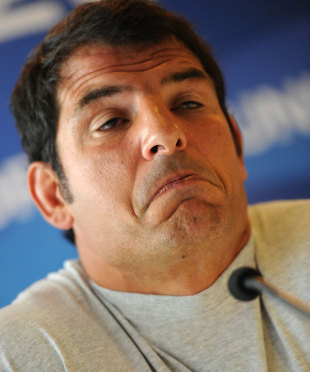|
Comment
Les Bleus on the brink
Ian Moriarty
September 28, 2011

Marc Lievremont has few supporters left in the French media
© Getty Images
Enlarge
You couldn't make it up. While the rest of rugby's major nations have spent the first couple of weeks of this World Cup jostling for position and building their form towards the quarter finals, the French, if some sections of the media are to be believed, have hit the implode button. The only predictable thing about the French from now on will be that you can expect collateral damage, although to what quarter isn't clear. Coach Marc Lièvremont made a handful of changes for Saturday's pool closer against Tonga, starting William Servat, Raphael Lakafia and Alexis Palisson and most surprisingly of all keeping Morgan Parra at 10. However, perhaps the most interesting thing to come out the press conference earlier in the week was the decision by Lièvremont to send out Lionel Nallet to fend off suggestions of a player revolt. The relationship between the French coach and the media has hit rock bottom in recent weeks but that doesn't seem to have stopped him from using the media as a tool for criticizing players, or in this case, shoring up the idea that there was nothing to see here, just move along. By Wednesday, it was the turn of veteran prop Jean-Baptiste Poux to attempt the Comical Ali routine. The 32-year-old admitted there had been tension in the camp but that it was "normal to have tension" and that it was "all part of the thing". One thing is sure: the fallout from last weekend's match against New Zealand continues to set the agenda and ambience. Nevertheless, France have lost like this before, so why is it different this time? Perhaps it is because the French people and by extension, the French media, no longer believe that Marc Lièvremont is capable of anything other than catastrophe. Where the players are in all this is very much dependent on what side you believe but it would be fair to say Lièvremont won't be topping Damien Traille's Christmas card list in a couple of months time. Capped 85 times for his country, Traille has been a magnificent servant for France over the years but to see the 32 year-old hauled off at half time last weekend after a nightmare 40 minutes was tragic, to say the least. "I didn't have the impression that I was the only one responsible," a crestfallen Traille told the French press after the game. "I've played everywhere on this French team. But it is the management who decide…" Traille's ejection from the game was proof, if any was needed, of the malaise that this French team has suffered since Lièvremont took over. Yes, he was awful but Traille's misfortune is that he should never have been there in the first place. He has always been a centre but the French coach saw something in him that he didn't have. Nothing new in that - the Lièvremont era feels like one giant compendium of wacky experiments and fatal errors, held together with sticky tape, and it seems that the final chapter has yet to be written. Morgan Parra's selection at fly-half is another prime example. Francois Trinh-Duc has struggled to find form so far but it beggars belief that Lièvremont wouldn't use the Tonga match to get him up to speed if he intends to start him in the quarter finals. Having picked only two fly-halves in his squad, the French coach was in trouble from the off when David Skrela was injured in the Japan match. We were told Skrela's World Cup was over and he flew home to France but the news from his Clermont Auvergne is that the former Toulouse and Stade Francais 10 is already back in training - thereby making a mockery of the French management's decision to send him home. You couldn't make it up. Now more than ever, France needs its experienced players to stand up and be counted. Perhaps mirroring England four years ago, Les Bleus need players of the calibre of Servat, Nallet, Dusautoir and Yachvili to guide the nucleus of the squad over the next few weeks. The decision to move Maxime Médard to fullback is a good one, because while question marks remain over his aerial ability, it allows Alexis Palisson to come in and give the French back three some real counter attacking threat. The introduction of Lakafia is a risk and Louis Picamoles can consider himself unfortunate in not getting another bite of the cherry. But Lakafia is a huge talent and could yet make a name for himself in this World Cup, if he avoids getting hauled off at half time. Yet it is the introduction of the Servat that could be the most telling. The Toulouse hooker is a world-class player and one of the few who can consistently reproduce his best form. Ironically, the further France get in this competition by putting out abject performances, the greater chance that they can save their one big performance for a time when it matters - in the final. While that might be extremely unlikely, who knows what the French are going to do next? Marc Lièvremont doesn't. © ESPN Sports Media Ltd.
|
Live Sports
Communication error please reload the page.
-
Football
-
Cricket
-
Rugby
-
- Days
- Hrs
- Mins
- Secs
F1 - Abu Dhabi GP
Abu Dhabi Grand Prix December 11-131. Max Verstappen ()
2. Valtteri Bottas (Mercedes)
3. Lewis Hamilton (Mercedes)
4. Alexander Albon ()
5. Lando Norris ()
6. Carlos Sainz Jr ()
-
ESPNOtherLive >>
Darts - Premier League
Golf - Houston Open
Snooker - China Open
Tennis - Miami Open

